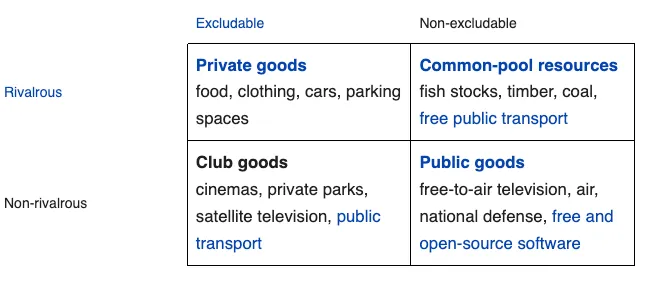
Organizations 2.0
This release of Organizations is so big it’s getting its first major version bump in over 2,000 years.
The most recent release was a misguided patch that moved consensus into media layers. That change has been reverted and lessons learned about hotfixing production!
Here’s what’s new:
* Organizations no longer require a leader
* Public goods no longer degrade over time
* Organizations are now self-sustaining 🚀
Thanks to everyone who made this release possible, including Hardin, Coase, Olson, Nakamoto and Lancashire.
Please be careful when upgrading from a 1.x organization — 2.x is not backwards compatible.
Everybody knows the problem with group projects. Somebody doesn’t pull their weight but wants the same grade as everybody else.
Or there’s a dog park near your house that’s nice, but sometimes people don’t pick up after their dogs, making it not so nice.
Or sometimes a Reddit moderator will unfairly use their position to promote and bury stories according to their personal bias, rather than what’s best for the subreddit.
Viewed through the lens of society — these people are dicks. But viewed through the lens of economics — these people are following their incentives.
What’s best for the individual and the group don’t always align. And as the group gets bigger, these alignment problems get worse.
Humans fix incentive problems like these with culture — which is why we boost some (teachers, nurses, firefighters) and cancel others.
It’s also why politics is so cutthroat; it’s how we decide who gets to use scarce resources.
But anybody whose been in a highly political organization vs. a rapidly growing and dynamic one knows which is better.
Organizations of all types are at the core of the human experience — so having something new to say about them would be big news.
A New Kind of Organization
Imagine an organization that is open to everybody and doesn’t have a leader.
People get paid based on the value they create.
And nobody can mess it up or take advantage of the system.
This kind of organization is possible today, using technology invented in the last dozen years.
But calling it technology doesn’t do it justice—it misses the high-order bit: it’s a breakthrough in the way humans organize.
These problems are thousands of years old, dating back to the beginning of civilization when humans started working together in large groups.
There haven’t been solutions… until recently.
Sometimes when people talk about Bitcoin or blockchains or Ethereum or whatever, they talk about micropayments or tokens or nfts, etc..
These are all fine, but these aren’t what matter.
What really matters is humans, and what matters about Bitcoin is that it changed the way humans behave.
Bitcoin let people who didn’t know each other and didn’t trust each other cooperate, despite people working against them.
Satoshi Nakamoto, the creator of Bitcoin, solved a difficult collective action problem by converting it into a free-market economic problem.
Said another way, he found a way to let people cooperate—by converting the social problem of coordinating people, into the economic problem of coordinating people — and letting the free market do what it does best.
It’s genius. And it’s at the core of what makes Bitcoin special, called Nakamoto Consensus.
It’s what allows Organizations 2.0 to no longer require a leader, and in the Reddit social problem, it’s what allows a large group of people to moderate themselves.
Instead of relying on a small cartel of moderators to filter information for everybody, it could be open and leaderless — just like Bitcoin.
That would be a new kind of organization worth exploring.
A New Kind of Public Good
Open and leaderless organizations are a big deal and underappreciated… but they’re not the end of the story.
These types of organizations don’t mean much if they end up captured. An organization must be self-sustaining to remain open and leaderless.
If parts of the system don’t self-sustain, they’ll end up privately owned. As it gets big, a monopoly or cartel will form, and the organization will lose its original decentralized properties.
Blockchains rarely get viewed through the lens of public goods, because they’re free markets with a bias towards empowering the individual.
But wanting blockchains to be open and leaderless makes them behave like public goods—so they shouldn’t be viewed solely through the lens of free markets:
These problems are collective action problems: a type of problem that leads to market failure when individuals can profit by behaving in ways that impose costs on the society as a whole…
Economists have written about these types of market failures for decades. An entire school of research (“public choice theory”) is in fact devoted to what happens in markets with these sorts of incentive misalignments. The critical problem is that in a free market you cannot prevent individuals from taking these profits without restricting their behavior or punishing them by exactly the sort of trusted third-party or market cartel (collusion) that negates the raison d’etre of a public blockchain.
Blockchains aiming for decentralization need to fix the long-standing problems associated with public goods, or the “security” of the network won’t matter.
To fix the public good problems associated with blockchains, you have to pay for everything required to sustain the network, and not let anyone degrade the chain unfairly—or it won’t work:
While Bitcoin did solve a complex collective action problem, it didn’t balance the incentives properly and the system is ripping itself apart.
Solving this isn’t easy, every blockchain has this problem.
Most “self-sustaining organizations” use some form of governance —which is nothing new and fraught with politics.
But what is new, is doing What Bitcoin Did—using economics and software to solve (previously thought) impossible collective action problems.
Most projects in crypto are not doing this — they’re doing fancy technical stuff. Breakthroughs in collective action problems are rare. And they tend to be more economic than technical because of how they’re being solved—the social problems being reframed into incentive systems and baked into software. It's why Bitcoin was such a big deal.
Saito did What Bitcoin Did; they found a way to convert collective action problems into economic problems — and then solved them with the free market. By doing so, they created a self-sustaining system that is open, leaderless, and doesn’t degrade over time.
Saito accomplished this by solving the two other social problems from above: group projects and dog parks.
These problems are similar. In a group project, somebody gets to benefit from you unfairly. In a dog park, somebody gets to impose costs on you unfairly. Both of these destroy large-scale group participation.
Saito solves the group project problem by finding a way to pay group members for valuable and necessary work, and if somebody isn’t contributing, they don’t get paid.
Saito solves the (digital) dog park problem by finding a way to prevent people from imposing unfair costs on others.
Both of these are done in a leaderless and open way—enabling a self-sustaining system—the first of its kind.
One caveat is, a physical dog park has challenges that would have to be overcome. Digital organizations are far easier to upgrade to 2.0, which is one reason why blockchains, DAOs, and subreddits are excellent first candidates.
Software being free like speech and free like beer provides asymmetric power — that it can run consensus mechanisms without human input is a big part of what enables Organizations 2.0.
The New Way
Nakamoto Consensus enables organizations to be open and leaderless. Saito Consensus lets them stay that way.
Nakamoto and Saito Consensus are fundamental building blocks — scientific discoveries worthy of a Nobel.
They enable blockchains, but more fundamentally, they represent a new way for humans to organize.
By converting long-standing collective action problems into self-sustaining economic networks, they’re innovating age-old problems that prevent large-scale collaboration — enabling cooperative behaviors at a level never seen before.
Bitcoin and Saito are two systems that show how powerful Organizations 2.0 can be; these systems are real-world examples demonstrating how their unique ingredients (their consensus algorithms) enable a tectonic shift in civilization-building infrastructure.
Organizations 2.0 doesn’t solve everything; it’s no utopia. We’ll still have problems, and human nature still exists. But allowing humans to level up their leaky abstractions for interacting with each other in large groups is one giant leap for mankind.
By creating Organizations based on better incentives, as they get big, we don’t have to depend on politics to keep them intact.
What do you think happens when all of the energy that usually goes into maintaining consensus gets released into something more worthwhile?
Welcome to Organizations 2.0 — welcome to The Zen of Saito.
